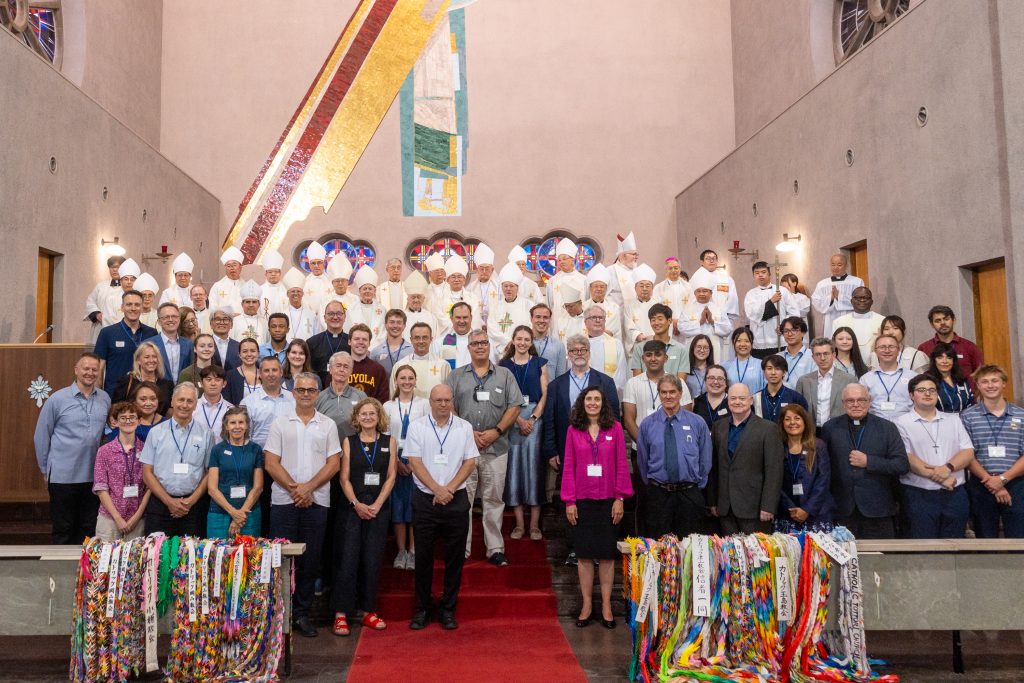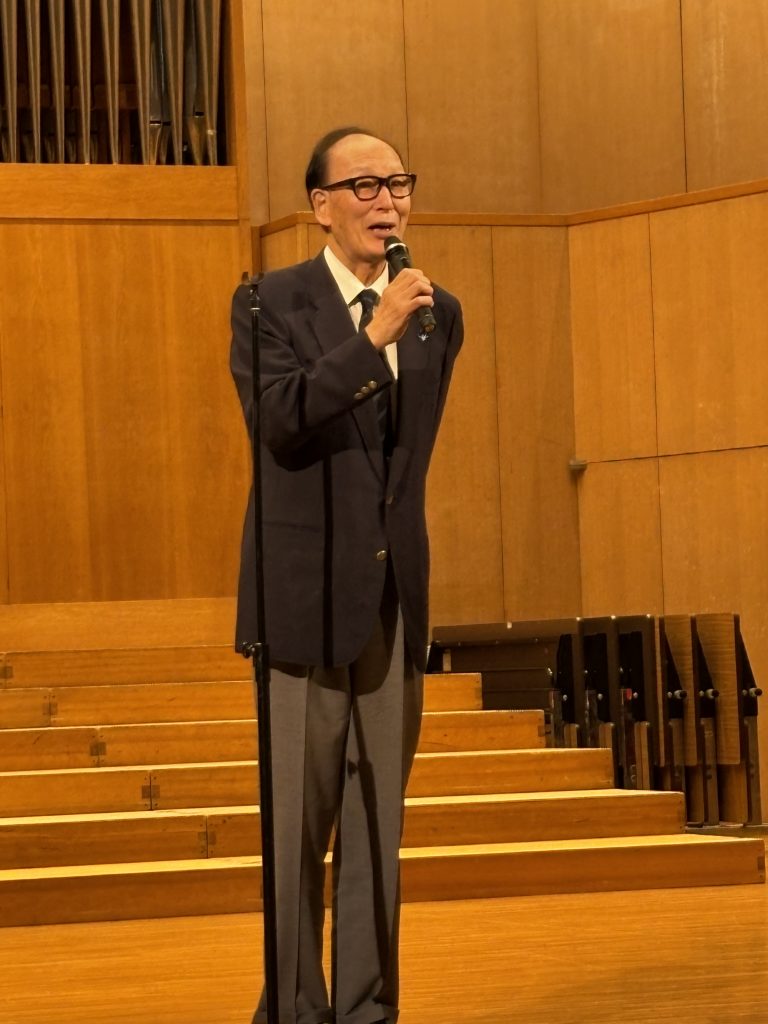
This year’s pilgrimage to Japan to mark the 80th anniversary of the atomic bombings of Hiroshima and Nagasaki includes the Nuncio to Japan, Archbishop Francisco Escalante Molina, all bishops of Japan, four bishops from the US; Cardinal Cupich of Chicago, Cardinal McElroy from Washington DC, Archbishop Wester from Santa Fe and myself.
Another addition to our pilgrimage this year includes Administrators and students from several US Catholic Universities. Some of this group are Fr. Robert Dowd, President of Notre Dame, Tom Banchoff, Vice President for Global Engagement, Georgetown University, George Trone, Vice President and Chief of Staff, Loyola University Chicago, Fr. John Thiede, sj, Vice President for Mission and Ministry, Marquette University and Fr. Sali Augustine, sj, Chancellor of Sophia School Corporation, Tokyo.
Our central purpose in these days is to remember and pray for those who died in these bombings. We celebrate Mass each day which is our highest form of prayer to give thanks to God, to present our fervent requests for peace, and to seek the divine grace necessary to bring about a world of peace where all humanity can live according to God’s design.
There are also numerous interfaith prayer services, as well as symposia for the sharing of ideas and building relationships which can further our efforts to promote peace and advocate for the dismantling of the nuclear arsenals and weapon systems that threaten humanity and all of creation. This is also one of the central goals of our partnership.
Yesterday we gathered at Elizabeth University School of Music for several hours. We honored the most recent recipients of the Nobel Peace Prize, the Hibakusha (survivors of the the bombings) who for these past decades have given witness to their suffering and experience advocating for the elimination of nuclear weapons. I am always deeply moved when meeting and listening to these heroic individuals.

Mr. Hiroshi Kanemoto, Representative Director of the Japan Confederation of A- and H-Bomb Sufferers Organization. He was only 9 months old the day of the bombing. He and his older sister were about a mile and a half away from the hypocenter.
80 years after the bombings, the number of survivors are diminishing greatly. Thus the urgency of more people who are prepared to keep the memory of this tragic moment alive so that we never forget. This is one of the great goals of our Partnership for a World Without Nuclear Weapons.
After one meets and visits with these survivors (Hibakusha), or visits the peace memorial museums, or walks the sacred ground where the bombs were dropped, there is only the conviction that humanity cannot survive such an event today or in the future.
Cardinal McElroy gave a moving presentation recalling the moment when Pope Francis advanced the Church’s teaching regarding Nuclear weapons. In 2014, the Church’s stance regarding deterrence was this posture was not advancing disarmament efforts and held that “the very possession of nuclear weapons, even for purposes of deterrence, is morally problematic.” But, during a symposium at the Vatican in 2017, Pope Francis shifted this teaching significantly when he stated: “the threat of their (nuclear weapons) use, as well as their very possession, is to be firmly condemned.”
Cardinal McElroy reflected upon this teaching in today’s context:
In this context, it must be concluded that the acceptance and concomitant normalization of deterrence have utterly failed the moral requirement to frame a pathway toward the elimination of nuclear weapons. Deterrence is not a step on the road to nuclear disarmament, but a morass. That is why the Church could not continue to tolerate an ethic which de facto legitimates possession.
At the conclusion of the symposium, The bishops of our Partnership for a World Without Nuclear Weapons (Japan, South Korea and US) issued a joint statement of resolve and purpose. We encourage many other bishops, religious, dioceses, parishes and organizations to join our Partnership and our work for a more peaceful world without nuclear weapons.
Joint statement
Toward Solidarity to Protect All Life
On the occasion of the 80th anniversary of the atomic bombings and the end of World War II, we, the undersigned representatives of atomic bomb survivor organizations, cardinals, archbishops, and bishops of the Catholic Church in the United States, South Korea, and Japan, have gathered in Hiroshima to remember the victims of World War II, to honor the memory of those who endured unimaginable suffering caused by the atomic bombings, including those from the Korean Peninsula and other regions of Asia, and to pray that such a tragedy will never be repeated. We are pleased that the longstanding efforts of the Japan Confederation of A- and H-Bomb Sufferers Organizations (Nihon Hidankyo) have been prominently recognized with last year’s Nobel Peace Prize. We pray that the earnest wishes of the aging atomic bomb survivors for world peace and the elimination of nuclear weapons reach and move people around the world.
Recently, concerns have been raised that signatories to the Nuclear Non-Proliferation Treaty (NPT) are not fulfilling their obligation under Article 6 to negotiate in good faith for nuclear disarmament. Additionally, militarized alliances, particularly with nuclear weapon states, are increasingly viewed as crucial for national protection. We, who are committed to carrying on the dedication of atomic bomb survivors, recognize that the destructive power of nuclear weapons threatens the survival of humanity. We strongly press on the urgent need for the international community to build nonviolence, anchored in dialogue and cooperation, as the foundation of our zelous pursuit of peace and solidarity.
On the occasion of the 80th anniversary of the atomic bombings and the end of World War II, we strongly condemn all wars and conflicts, the use and possession of nuclear weapons, and the threat to use nuclear weapons. We refuse to accept persistent justifications for atomic bombings as a means of ending war. Alongside other civil society and religious organizations, we will continue to protest the inhumanity of nuclear weapons and insist on the common good of protecting the earth and all life on it. We advocate for the ratification and expansion of the Treaty on the Prohibition of Nuclear Weapons (TPNW). We also commit to cooperating with efforts called for in Articles 6 and 7 of the TPNW to support victims of nuclear weapons and to restore environments affected by nuclear weapons.
The undersigned bishops of the United States, South Korea, and Japan who have been given the opportunity to gather here to dialogue for peace with hibakusha associations commit to expanding our circle of peace and solidarity internationally. In particular, we understand that efforts will be made to expand the “Partnership for a World Free of Nuclear Weapons” (PWNW), established by the by the Diocese of Hiroshima and the Archdiocese of Nagasaki, two Japanese dioceses affected by the atomic bombing, and the Archdioceses of Santa Fe and Seattle, two U.S. dioceses still threatened by nuclear weapons research, development, production, and possession.
In commemoration of the 80th anniversary of the atomic bombings, August 5, 2025.
[Bishops in the United States]
Archdiocese of Chicago: Blase Cardinal Cupich
Archdiocese of Washington, D.C.: Robert W. Cardinal McElroy
Archdiocese of Seattle: Archbishop Paul D. Etienne
Archdiocese of Santa Fe: Archbishop John C. Wester
【Korean Bishops】
Diocese of Incheon: Bishop John Baptist Shin-chul Jung
Diocese of Uijeongbu: Bishop Benedictus Hee-song Son
Diocese Chuncheon: Bishop Simon Ju-young Kim
[Japanese Bishops]
Archdiocese of Tokyo: Tarcisius Isao Cardinal Kikuchi
Archdiocese of Osaka-Takamatsu: Thomas Aq. Man’yo Cardinal Maeda
Archdiocese of Nagasaki: Archbishop Peter Michiaki Nakamura
Diocese of Nagoya: Bishop Michael Goro Matsuura
Diocese of Sapporo: Bishop Bernard Taiji Katsuya
Diocese of Fukuoka: Bishop Joseph Maria Abeya Batlle
Diocese of Saitama: Bishop Mario Michiaki Yamanouchi
Diocese of Sendai: Bishop Edgar Gacutan
Diocese of Niigata: Bishop Paul Daisuke Narui
Diocese of Oita: Bishop Sulpice Shinzo Moriyama
Diocese of Hiroshima Diocese: Bishop Alexis Mitsuru Shirahama
Archdiocese of Nagasaki: Archbishop Emeritus Joseph Mitsuaki Takami
[A-bomb Survivor Organizations]
Hiroshima Prefectural Council of Atomic Bomb Survivors Organizations
(President: Tomoyuki Mimaki)
Hiroshima Prefectural Council of Atomic Bomb Survivors Organizations
(President: Kunihiko Sakuma)
Korean Special Committee for Atomic Bomb Victims
(Chairman: Shun-Go Kwon)
Hiroshima Prefectural Council of Korean A-bomb Survivors
(Chairperson: Chin-Ho Kim)
Hiroshima Prefectural Trade Union Congress Liaison Council of A-bomb Survivor Organizations (Akio Kanzaki, Chairman)
Hiroshima City Council of Atomic Bomb Survivors (Chairman: Kazumi Matsui)
Hiroshima Liaison Conference of A-bomb Survivor Organizations
(Executive Director: Soji Tanaka)
2